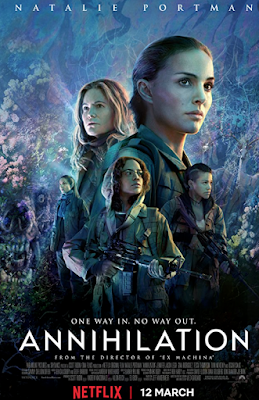On the Nature of Being, Creation, & Beauty: Annihilation ("Movie Monday")
"Movie Monday"...
A biology professor delivers her beginning-of-term lecture on the amazing replicative ability of a single cell… the building block of the entire universe
A soldier—MIA and presumed dead—suddenly reappears… somehow altered by whatever experience he’s been through over the past year.
And, a mysterious phenomenon—referred to as “the Shimmer”, due to its glimmering appearance—threatens to consume anything—and everyone—in its path… creating seemingly-impossible hybrids from that which it absorbs.
So begins Alex Garland’s 2018 film, Annihilation.
When biologist Lena’s (played by Natalie Portman) husband Kane (Oscar Isaacs) returns, she quickly goes straight from that shock to another, as he starts convulsing and spewing blood within minutes of his surprise appearance.
It’s only after he’s been spirited away to a military hospital that she—and we—begin to find out what’s really going on: Kane—along with many others before him—was sent on a reconnaissance mission into the area encompassed by the Shimmer (a dangerous and inexplicable something, in the middle of nowhere, spawning bizarre mutations within its ever-widening boundaries). Of all those who went in, Kane, alone, made it out.
With Kane’s life hanging by a thread, and the doctors entirely at a loss as to what to do, Lena volunteers to go on the next scouting mission to collect biological samples which may, conceivably, give the doctors some insight on how to treat him.
Led by the all-business Dr. Ventress (Jennifer Jason Leigh), a team of five (all women, in a pleasant little twist) scientists head out into the unknown… in the hopes of making it more than only Kane to survive the journey, and stopping the Shimmer’s steady encroachment.
_______________
Much like Garland’s other work (including 2015’s Ex Machina and the script for the 2007 Danny Boyle-directed Sunshine—both of which I loved), you need to mentally prepare yourself beforehand for a slower pace, since Garland’s vision isn’t your standard all-action-all-the-time sci-fi blockbuster, but rather a languid, thought-provoking feast for the senses.
Much like Garland’s other work (including 2015’s Ex Machina and the script for the 2007 Danny Boyle-directed Sunshine—both of which I loved), you need to mentally prepare yourself beforehand for a slower pace, since Garland’s vision isn’t your standard all-action-all-the-time sci-fi blockbuster, but rather a languid, thought-provoking feast for the senses.
Scene after scene of incredible beauty (at times attaining a level of utter wonder) carry you through the measured gait of Annihilation, on the way to an ending that, well… fits the rest of the film, both thematically and in execution.
Is it “exciting”, per se? That depends on what you’re looking for, here. You’re certainly unlikely to ever feel your heart about to gallop out of your chest. Instead, Annihilation is, for the most part, a quiet, thoughtful, and restrained pleasure, with a fairly simplistic story at its core… but larger implications and questions, should you desire to ponder a bit more deeply.
Is it “exciting”, per se? That depends on what you’re looking for, here. You’re certainly unlikely to ever feel your heart about to gallop out of your chest. Instead, Annihilation is, for the most part, a quiet, thoughtful, and restrained pleasure, with a fairly simplistic story at its core… but larger implications and questions, should you desire to ponder a bit more deeply.
And sometimes, in this age of increasingly-OTT extravaganzas, that’s exactly the sort of movie we really need.
~GlamKitty
(Note: If your time and budget allow, you should definitely see Annihilation on the big screen, to fully appreciate how visually-stunning it is.)



Comments
Post a Comment
No ads or shilling, please. And always, always be polite.